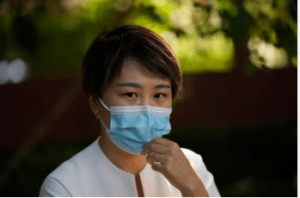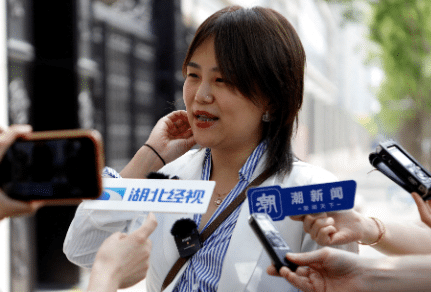Beijing, August 7, 2024 — A Beijing court has sustain a ruling against Teresa Xu, an unmarried Chinese woman who take legal action againsa hospital for the right to freeze her eggs. This decision concludes a six-year legal battle that has drawn significant national attention and burned debate about reproductive rights in China.The Chaoyang Intermediate People’s Court announced Tuesday that the hospital did not violate Xu’s rights when it contest her access to egg freezing services. Xu, now 36, first sought the procedure in 2018 at the age of 30. During her initial consultation, she was informed that she could not proceed because she was not married, in accordance with Chinese hospital regulations.

“This isn’t outside of my expectations,” Xu said in a livestream on Wednesday, following the court’s decision. “All these years, we finally have an end, and an answer.”
Xu recalled her 2018 consultation, where the doctor encouraged her to have a child immediately rather than pursue egg freezing. “The doctor kept on trying to persuade me, ‘You should have a child now,’” Xu recounted in 2019. “She said, ‘Your career can develop at any time, but it’s harder to have a child later on.’” While the doctor was kind, the experience left Xu feeling frustrated and angry. “I was looking for a professional service but got this life advice instead.”
After exploring alternative options such as egg freezing abroad, Xu found the costs prohibitive. She faced multiple hurdles in getting the court to accept her case in 2019, and the process was further delayed by the COVID-19 pandemic. In 2022, the Chaoyang Intermediate People’s Court ruled that the hospital did not violate her rights, prompting Xu to appeal the decision.
Xu acknowledged the slim chances of winning the appeal but pursued it due to its potential societal impact. She noted that the judgment included positive language despite the unfavorable verdict: “As our country’s policy on births is adjusted, relevant medical and health laws, regulations, diagnosis and treatment standards, and medical ethics standards may also change accordingly.”
Xu’s case highlights the restrictive nature of China’s reproductive policies and has intensified discussions about the need for reforms to accommodate the reproductive choices of unmarried women. As the country grapples with evolving societal norms and demographic challenges, Xu’s fight underscores the broader struggle for reproductive autonomy and the potential for future policy changes.
Beijing, August 7, 2024 — A Beijing court has upheld a ruling against Teresa Xu, an unmarried Chinese woman who sued a hospital for the right to freeze her eggs. This decision concludes a six-year legal battle that has drawn significant national attention and sparked debate about reproductive rights in China.
The Chaoyang Intermediate People’s Court announced Tuesday that the hospital did not violate Xu’s rights when it denied her access to egg freezing services. Xu, now 36, first sought the procedure in 2018 at the age of 30. During her initial consultation, she was informed that she could not proceed because she was not married, in accordance with Chinese hospital regulations.
“This isn’t outside of my expectations,” Xu said in a livestream on Wednesday, following the court’s decision. “All these years, we finally have an end, and an answer.”
Xu recalled her 2018 consultation, where the doctor encouraged her to have a child immediately rather than pursue egg freezing. “The doctor kept on trying to persuade me, ‘You should have a child now,’” Xu recounted in 2019. “She said, ‘Your career can develop at any time, but it’s harder to have a child later on.’” While the doctor was kind, the experience left Xu feeling frustrated and angry. “I was looking for a professional service but got this life advice instead.”
After exploring alternative options such as egg freezing abroad, Xu found the costs prohibitive. She faced multiple hurdles in getting the court to accept her case in 2019, and the process was further delayed by the COVID-19 pandemic. In 2022, the Chaoyang Intermediate People’s Court ruled that the hospital did not violate her rights, prompting Xu to appeal the decision.
Xu acknowledged the slim chances of winning the appeal but pursued it due to its potential societal impact. She noted that the judgment included positive language despite the unfavorable verdict: “As our country’s policy on births is adjusted, relevant medical and health laws, regulations, diagnosis and treatment standards, and medical ethics standards may also change accordingly.”
Xu’s case highlights the restrictive nature of China’s reproductive policies and has intensified discussions about the need for reforms to accommodate the reproductive choices of unmarried women. As the country grapples with evolving societal norms and demographic challenges, Xu’s fight underscores the broader struggle for reproductive autonomy and the potential for future policy changes.
Beijing, August 7, 2024 — A Beijing court has upheld a ruling against Teresa Xu, an unmarried Chinese woman who sued a hospital for the right to freeze her eggs. This decision concludes a six-year legal battle that has drawn significant national attention and sparked debate about reproductive rights in China.
The Chaoyang Intermediate People’s Court announced Tuesday that the hospital did not violate Xu’s rights when it denied her access to egg freezing services. Xu, now 36, first sought the procedure in 2018 at the age of 30. During her initial consultation, she was informed that she could not proceed because she was not married, in accordance with Chinese hospital regulations.
“This isn’t outside of my expectations,” Xu said in a livestream on Wednesday, following the court’s decision. “All these years, we finally have an end, and an answer.”
Xu recalled her 2018 negotiation where the doctor encouraged her to have a child immediately rather than pursue egg freezing. “The doctor kept on trying to persuade me, ‘You should have a child now,’” Xu recounted in 2019. “She said, ‘Your career can develop at any time, but it’s harder to have a child later on.’” While the doctor was kind, the experience left Xu feeling frustrated and angry. “I was looking for a professional service but got this life advice instead.”
After exploring alternative options such as egg freezing abroad, Xu found the costs prohibitive. She faced multiple hurdles in getting the court to accept her case in 2019, and the process was further delayed by the COVID-19 pandemic. In 2022, the Chaoyang Intermediate People’s Court ruled that the hospital did not violate her rights, prompting Xu to appeal the decision.
Xu acknowledged the slim chances of winning the appeal but pursued it due to its potential societal impact. She noted that the judgment included positive language despite the unfavorable verdict: “As our country’s policy on births is adjusted, relevant medical and health laws, regulations, diagnosis and treatment standards, and medical ethics standards may also change accordingly.”
Xu’s case highlights the restrictive nature of China’s reproductive policies and has intensified discussions about the need for reforms to accommodate the reproductive choices of unmarried women. As the country grapples with evolving societal norms and demographic challenges, Xu’s fight underscores the broader struggle for reproductive autonomy and the potential for future policy changes.
Beijing, August 7, 2024 — A Beijing court has upheld a ruling against Teresa Xu, an unmarried Chinese woman who sued a hospital for the right to freeze her eggs. This decision concludes a six-year legal battle that has drawn significant national attention and sparked debate about reproductive rights in China.
The Chaoyang Intermediate People’s Court announced Tuesday that the hospital did not violate Xu’s rights when it denied her access to egg freezing services. Xu, now 36, first sought the procedure in 2018 at the age of 30. During her initial consultation, she was informed that she could not proceed because she was not married, in accordance with Chinese hospital regulations.
“This isn’t outside of my expectations,” Xu said in a livestream on Wednesday, following the court’s decision. “All these years, we finally have an end, and an answer.”
Xu recalled her 2018 consultation, where the doctor encouraged her to have a child immediately rather than pursue egg freezing. “The doctor kept on trying to persuade me, ‘You should have a child now,’” Xu narrate in 2019. “She said, ‘Your career can develop at any time, but it’s harder to have a child later on.’” While the doctor was kind, the experience left Xu feeling frustrated and angry. “I was looking for a professional service but got this life advice instead.”
After exploring alternative options such as egg freezing abroad, Xu found the costs prohibitive. She faced multiple hurdles in getting the court to accept her case in 2019, and the process was further delayed by the COVID-19 pandemic. In 2022, the Chaoyang Intermediate People’s Court ruled that the hospital did not violate her rights, prompting Xu to appeal the decision.
Xu acknowledged the slim chances of winning the appeal but pursued it due to its potential societal impact. She noted that the judgment included positive language despite the unfavorable verdict: “As our country’s policy on births is adjusted, relevant medical and health laws, regulations, diagnosis and treatment standards, and medical ethics standards may also change accordingly.”
Xu’s case highlights the restrictive nature of China’s reproductive policies and has intensified discussions about the need for reforms to accommodate the reproductive choices of unmarried women. As the country grapples with evolving societal norms and demographic challenges, Xu’s fight underscores the broader struggle for reproductive liberty and the potential for future policy changes.





